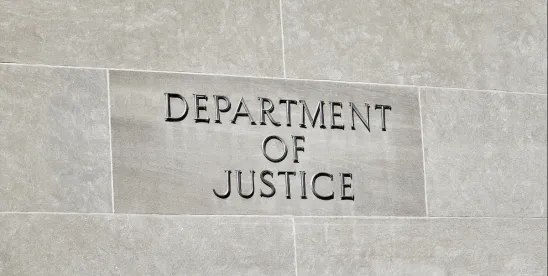From the outset of his current term in office, President Trump has made it a signature policy objective to target and dismantle diversity, equity, and inclusion (“DEI”) and so-called “gender ideology” in both the public and the private sectors. Blank Rome has covered these policy initiatives extensively, along with the various lawsuits challenging them. In the courts and elsewhere, the government has been questioned about what the phrase “illegal DEI” actually means.[1]
Perhaps in response to those queries, on July 29, 2025, the Department of Justice (“DOJ”) issued a memorandum titled “Guidance for Recipients of Federal Funding.” The memo’s stated objective is to offer “non-binding suggestions to help entities comply with federal antidiscrimination laws and avoid legal pitfalls,” thereby aiming to “minimize the risk of violations.”
This memo provides the most comprehensive insight about DOJ’s perspective on DEI and gender ideology practices to date, and thus serves as a valuable resource for recipients of federal funding as they review their current policies. Private employers, too, may find the memo a useful framework to evaluate potential risks associated with DEI initiatives and to discern what actions the Administration considers to violate civil rights laws. That said, the DOJ memo does not address certain practical questions that entities will face in trying to adhere to its guidance. Below, we summarize the memo and provide our analysis of its most significant aspects for federally funded entities and companies.
Key Takeaways from DOJ’s July 29, 2025 Memo
- Equal Treatment Is Paramount: DOJ emphasizes that everyone must be treated equally according to their merit/qualifications. Protected characteristics such as race, color, national origin, sex, and religion cannot form the basis for recruitment, hiring, admissions, internal programs, or other “preferential treatment” except in very specific circumstances.
- DEI Labels Do Not Excuse Discrimination: The language an organization uses to describe its programs will not shield it from legal scrutiny. The memo warns that DOJ will look behind seemingly neutral language for potential violations where the purpose of a particular practice is to “advantage or disadvantage individuals” based on a protected characteristic. DOJ warns that any initiative that results in preferential treatment based on protected characteristics presents risk.
- Strict Scrutiny for Race and Sex-Based Policies: Race-based classifications are subject to strict scrutiny, and sex-based classifications to heightened scrutiny. Only in rare, narrowly defined circumstances can such policies be justified.
- Review Hiring Practices. The memo calls for eliminating geographic, institutional, and other targets if meant to increase “underrepresented groups” in candidate pools calls for and focusing only on neutral business factors.
- Retaliation Is Prohibited: Individuals who object to or refuse to participate in discriminatory programs are protected from adverse actions.
Specific Examples of Unlawful Practices Identified by DOJ
The memo states that the federal government has historically “turned a blind eye” to or even promoted practices that are—in this administration’s view—discriminatory, and that “going forward” the government “will not stand by while recipients of federal funds engage in discrimination.” The memo provides numerous examples of practices that DOJ considers unlawful under existing anti-discrimination law:
- Race-Based Scholarships or Programs: Scholarships, internships, or leadership initiatives exclusively for specific racial or ethnic groups, or reserving spots for specifically identified individuals or groups based on protected characteristics.
- Preferential Hiring or Promotion: Prioritizing candidates from “underrepresented groups” for hiring or promotion or using demographic benchmarks in candidate pools based on protected characteristics. All employers should review policies that focus on increasing diversity in candidate talent pools. The memo suggests that recruiting strategies focused on increasing minority representation without other legitimate business reasons could be viewed as discriminatory.
- Segregated Spaces or Resources: Designating “safe spaces” or lounges for specific racial or ethnic groups or organizing training sessions that separate participants by race or sex.
- Compelled Participation in Discriminatory Training: Mandating participation in workplace training that stereotypes, excludes, or penalizes individuals based on protected characteristics, or creates a hostile environment, including, for example, references to white privilege and toxic masculinity.
New and Unanswered Questions from DOJ’s July 29, 2025 Memo
DOJ takes a number of affirmative stances in the memo, but it does not offer companies practical guidance on how to answer or reconcile issues they are likely to face if they are inclined to adopt DOJ’s recommended best practices.
- Potential Conflicts with Contractual Subcontracting Goals
The tenor of the DOJ memo creates potential conflicts with longstanding government programs designed to aid historically disadvantaged small businesses. Since the Business Opportunity Development Reform Act of 1988, federal government agencies have been required to establish contracting goals to benefit small businesses owned by socially and economically disadvantaged persons.[2] Nearly 40 years later, roughly $50 billion in federal prime and subcontracts are awarded to Small Disadvantaged Businesses annually. Many states have established similar goals for subcontracting with minority- or woman-owned businesses as part of their procurement processes. While not expressed as strict contract requirements, these goals aim to increase opportunities for participation in public contracts, and contractors or grantees are required to track and report their progress against these goals.
Selecting small business suppliers or subcontractors in furtherance of contractual goals to utilize woman-owned or minority-owned businesses would seem to contradict the views DOJ expresses in the memo. Federally funded entities have had questions for many months about whether their federal and state small business subcontracting goals are at odds with the government’s view of antidiscrimination laws. However, DOJ’s memo does not address the issue.
- Recommended Monitoring of Business Partners, Subcontractors, and Subawardees
The DOJ's memo includes suggestions for “best practices” by recipients of federal funding, to include:
- Flowing Down Anti-Discrimination Contract Clauses. Incorporating express nondiscrimination clauses in grant agreements, contracts, or partnership agreements to require that business partners and subcontractors comply with federal anti-discrimination laws.
- Contractual Recognition of Unallowed Use of Federal Funds. Specifying in those same business agreements that federal funds “cannot be used for programs that discriminate based on protected characteristics.”
- Third-Party Monitoring. Monitoring the practices of business partners, subcontractors, and subgrantees that receive federal funds to ensure their ongoing compliance with federal anti-discrimination law. DOJ proposes that this monitoring include reviewing program materials, participant feedback, and outcomes to identify potential discriminatory practices.
The notion of private companies “monitoring” the DEI or gender-based practices of other private companies, even when working together on government-funded contracts or projects, is unusual and casts prime contractors and awardees in a new, much more intrusive role. It is unclear how engaging in DOJ’s proposed monitoring of third-party business partners’ internal practices improves—or perhaps negatively impacts—risks for federally funded entities.
The DOJ memo does not address these issues. Nor does it answer the practical question of how and why a subcontractor or subawardee would agree to willingly provide another business with the data that DOJ suggests is needed for “monitoring.” Even if a company's business partners agreed to recognize their responsibility to adhere to federal antidiscrimination laws within a contract, many would be hesitant to disclose their internal operational data (i.e., “program materials, participant feedback, and outcomes”) to enable their prime contractor to review and render a view as to their compliance with antidiscrimination laws. Organizations are generally reluctant to share such details with third parties, especially when such information is unrelated to the primary engagement. This reluctance is particularly evident in government contracting, where companies collaborating on one project may become direct competitors on other projects.
We are unaware of any existing Federal Acquisition Regulation (“FAR”) clauses a prime contractor could flow-down to effectuate the monitoring activities that DOJ recommends in this memo. Notably, the DEI Certification requirement in Executive Order 14173 (which we previously analyzed in our February 19, 2025 client alert), has not undergone any formal rulemaking process, has not been standardized among federal agencies,[3] and is not a mandatory flow-down clause. Thus, a recipient of federal funding seeking to engage in the “monitoring” that DOJ recommends would have to negotiate the terms of access with what are likely to be resistant subcontractors.
For these reasons, it is important to bear in mind that DOJ stated that the guidance provided in its memo is “non-binding” and that DOJ’s suggestions should be evaluated for real-world feasibility.
- Documenting Lack of “Unlawful Proxy” Discrimination
The DOJ warns that companies should not conceal discriminatory practices through the use of “unlawful proxies”—i.e., they cannot use “ostensibly neutral criteria that function as substitutes for explicit consideration of race, sex, or other protected characteristics.” The memo provides three examples of unlawful proxy discrimination: (1) requiringd descriptions of "cultural competence" in a way that assesses racial or ethnic background rather than objective skills; (2) targeting recruitment to areas or institutions mainly due to their racial or ethnic makeup;[4] and (3) asking applicants for asking job applicants for narratives about obstacles they've overcome or diversity statements that favor discussion of protected characteristics.
DOJ advises, as a “best practice,” that organizations “rigorously evaluate and document” whether their stated criteria for programs or positions are proxies for race, sex, or other protected characteristics. While the DOJ frames this suggested best practice as a straightforward compliance measure, in practice this could involve an exhaustive, resource-intensive audit of every policy, practice, and decision-making process—far more intricate than the guidance appears to acknowledge.
Practical Steps for Organizations to Promote Inclusion While Minimizing Legal Risk
DOJ’s memo introduces new considerations for federally funded entities seeking to build diverse and inclusive workplaces in compliance with anti-discrimination laws. These changes may also impact private employers, as the DOJ memo likely signals future enforcement trends applicable to them. Therefore, both federally funded entities and private employers aiming to comply with legal requirements while remaining committed to their organizational principles should consider the following steps:
1. Ensure Inclusive Access
- Open all programs, activities, and resources to all qualified individuals, regardless of race, sex, or other protected characteristics.
- Avoid organizing groups, sessions, or events that exclude participants based on protected traits.
2. Focus on Objective, Job-Related Criteria
- Base selection decisions (e.g., hiring, promotion, admissions, scholarships) on specific, measurable skills and qualifications directly related to the opportunity at hand.
3. Eliminate Demographic-Driven Quotas and Benchmarks
- Discontinue any policy or practice that mandates representation of specific racial, sex-based, or other protected groups in candidate pools, hiring panels, or final selections.
4. Avoid Exclusionary or Stereotyping Training
- Ensure all training programs are open to all qualified participants and do not segregate or stereotype based on protected characteristics.
- Do not convey the idea that certain individuals possess certain biases based on their protected traits.
5. Establish Clear Anti-Retaliation Policies
- Implement and communicate policies prohibiting retaliation against individuals who raise concerns or refuse to participate in offered programs.
- Provide confidential, accessible channels for reporting concerns.
Final Thoughts on Fostering Inclusion in a New Era
The current legal environment presents considerable challenges when striving to create diverse, inclusive, and welcoming workplaces and learning environments. The latest DOJ memo underscores that these risks are not necessarily eliminated simply by using facially neutral language or by ending legacy DEI programs. We continue to recommend that all entities conduct their internal program assessments through counsel to maintain attorney-client privilege.
Importantly, it remains possible to promote inclusion, belonging, and opportunity by focusing on universal access, objective merit-based criteria, and a culture of respect for all. By carefully reviewing and updating policies, providing robust training on nondiscrimination, and documenting legitimate, nondiscriminatory rationales for all decisions, organizations can advance their values while minimizing legal risk.
[1] For example, in May 2025, DOJ announced a Civil Rights Fraud Initiative suggesting that it will use the civil False Claims Act (“FCA”) to investigate and pursue monetary recoveries based on “illegal DEI.” But, it may be difficult for the government or a whistleblower to establish the falsity and scienter elements of an FCA claim if the meaning of “illegal DEI” remains ambiguous.
[2] Unless further tailored by an agency, the default small business subcontracting plan goals are: 23 percent small businesses; 5 percent to small, disadvantaged businesses; 5 percent to women-owned small businesses; and 5 percent to service-disabled, veteran-owned small businesses. 15 U.S.C. § 644(g)(1). Social disadvantage “refers to persons who have been subjected to racial, ethnic, or cultural bias within American society because of their identities as members of groups and without regard to their individual qualities.” See 13 C.F.R. 124.103.
[3] In a February 18, 2025 court filing in the District Court of Maryland, DOJ stated that “the DEI Certification requirement does not purport to require that the relevant contracts/grants include the language in [EO 14173] § 3(b)(iv)(B) verbatim. Rather, this provision is simply a directive from the President to the agencies to include such certification provisions in substance.” National Association of Diversity Officers in Higher Education et al v. Trump et al, No. 1:2025cv00333, Document 35 (emphasis in original).
[4] The memo does not address DOJ’s view on, for example, holding a job fair at women’s colleges, Christian colleges, or historically black colleges and universities. Presumably an organization would need to be prepared to assert that it was motivated to recruit from such institutions based on a legitimate nondiscriminatory business reason – for instance in order to locate specific skills sets as opposed to stating that it was motivated by a desire to increase diversity or representation of a particular religious group.





 />i
/>i
